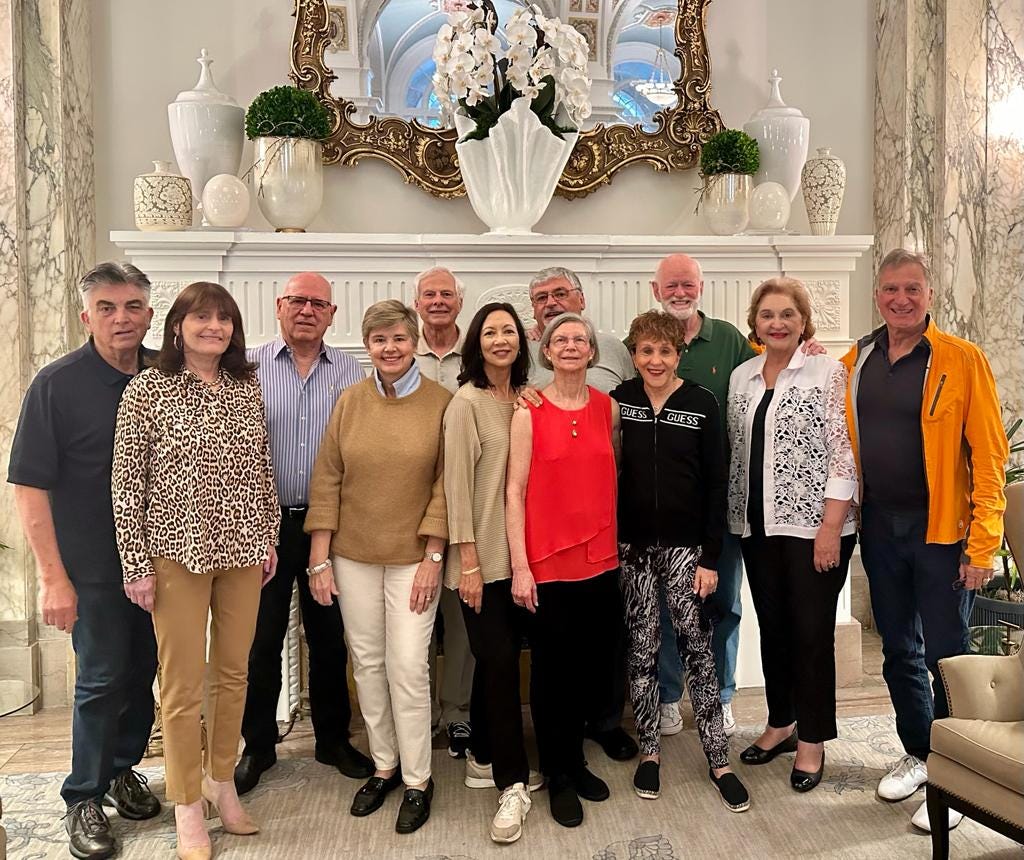The Learning Network, 25th Anniversary Edition
What are the meaning and effects of our history?
You Can’t Buy History. That’s been the motto of The Learning Network almost from the day Marshall Goldsmith founded it 26 years ago.
After astutely realizing that independent leadership consultants, writers and speakers had few opportunities to develop or connect with colleagues, Marshall began calling people he knew– some long-time friends, others he’d barely met– inviting us to show up in San Diego on the second weekend in January, 1997. The goal was simply getting to know one another.
I was thrilled when he called, seemingly out of the blue. We’d met that summer when we’d both delivered keynotes at the Peter Drucker Foundation’s annual conference, but we’d only spoken briefly. For me, his call could not have come at a better time because, though I was satisfied with my work, I’d been feeling professionally quite lonely.
I was always flying from city to city, speaking to interesting people, but spending limited time with them before flying out again. I often envied my clients, who got to stay behind and hang out with each other, while I was racing to my next engagement. My professional life looked good from the outside but I had no real community or network of support. I had friends and family, but their lives were very different from mine. Might Marshall’s invitation help me be more connected?
Arriving for our first gathering, I felt somewhat intimidated. The group seemed primarily composed of super-successful men, many of whom I considered famous and whose work had influenced my own. It hardly seemed possible that I was suddenly sitting among them at the Auberge Del Mar, a beautiful and uber-Californian hotel on the coast north of LaJolla.
Over time, I gained confidence and came to feel I belonged. By which I mean I understood not only how the group could be of benefit to me, but also how I could be of benefit to the group.
Year after year, I kept showing up, staying in touch and occasionally collaborating with fellow Learning Network members. Our connection was primarily fueled by our 3-day annual gatherings, which grew more personal and felt deeper as the years passed.
Then pandemic shifted our annual meetings onto Zoom until this past weekend, when at last we met again in person. This time we gathered in Nashville, where Marshall and his wife Lyda recently moved. The theme of our 25th reunion– celebrated in our 26th year– was quite naturally “You Can’t Buy History.” But this time, we set out to examine what that often-used phrase really means.
We broke it down into three questions:
Why can’t we buy history?
What does our history mean to us?
How has our history shaped our thinking?
The answer to the first question is the simplest. We can’t buy history because it’s not transactional, it’s rooted in experience. And while it may be possible to buy access to others, our actual experience with them is shaped by an unpredictable mix of aha moments, tension, and reciprocity. There’s a texture to experience, and a measure of serendipity that can’t be controlled or planned for.
The meaning of our history- that second question- usually manifests in vividly remembered moments that represent something larger, which is why reunions are so often consumed by “Do you remember?” For our tribe, this included the moment when our oldest and smallest member became the first to bisect a 2 by 4 with the side of her hand during an exercise that was popular at the time. Our shared astonishment brought us all together, along with the jarring recognition that mental focus was far more powerful than physical strength. It became a common reference point.
It also became a shared lesson, which gets to the heart of the third question, how our history shapes our thinking. As one TLN member, Chris Cappy, noted: we are all primarily teachers, and teachers always teach what they need to learn. Learning together, as we did with the board chop, gives us not only shared memories, but makes us participants in and witnesses to one another’s growth. Our thinking evolves collectively, which further strengthens our ties even as it enriches our reasoning.
Before The Learning Network, I assumed that building a rewarding career as author and speaker came with a price: I would have to do it all on my own. But because I said yes when this guy named Marshall called, after having only met me once, I’ve been able to avoid the pitfalls of professional isolation and the loneliness that goes with it. I’ve also learned life’s most important lesson: don’t even try to do it alone.
Click here to order my new book Rising Together from Amazon. Also available from your favorite bookseller. Thank you for your support!






Thank you Shannon. Glad you grasped the essential point- the loneliness inherent in how we work, Sally
What a wonderful history, Sally. This work is very lonely work most of the time. I'm so glad you found your tribe!